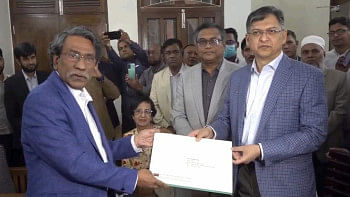He came, he spoke, he went away

While it's been almost two-weeks since the Indian Prime Minister Narendra Modi visited Bangladesh, the ripples of his visit are still being felt in our public discourse. The initial euphoria and feel-good factor transformed into a reappraisal that seems to be moving toward doubt and disappointment. I am not totally surprised at the gradual downward shift in the public mood. Mr. Modi is a great orator and hit the right notes to get the Bengali psyche all hyped up, initially. But as emotions subsided, expectations began to match reality.
Personally, the outburst of public exuberance and overreaction to Prime Minister Modi's June 8 speech in Dhaka left me quite embarrassed, even a bit ashamed. The substance of Mr. Modi's speech did not trigger these feelings. Neither were they impacted by the subsequent Twitter war on his casual comment about Prime Minster Hasina's actions against terrorism "despite being a woman". I am simply stupefied at the Bangladeshi propensity to be carried away by rhetoric. There are some who gushed forth with unqualified adulation: "Oh! He noticed the poster of our female cricket icon Salma Khatun and praised the country's progress on gender issues" or "he eulogised our Mukti Bahini" (after 44 years?). Some Modi apologists have gone as far as trying to convince his detractors that he has had a sincere change of heart since his Gujarat riot controversy. And that he is now firmly committed to secularism. Regrettably, there is also a third group putting up anti-Modi posts on the social media, calling him a hypocrite and mass murderer who is now playing to the gallery.
The point is not whether or not I subscribe to any of these opinions but that I have become shamefully aware of being a part of a society that has been focusing on the Indian PM's public persona and charisma (or lack of it) rather than on the real outcome of the visit. I am truly amazed at our inability to think dispassionately and be objective. Should we not be asking ourselves: what has Bangladesh reaped from the visit? It certainly helped create a good neighbourly feeling, which by the way is quite an achievement in terms of relations with a powerful neighbour. There is no doubt that a trust base has been created and it marks a beginning toward further collaboration among the SAARC countries. All this notwithstanding, the score card of tangible benefits reads as follows: Water deal on the Teesta? No. Special visa privileges? No. Land Boundary Agreement resolving a decades-old dispute? Yes. On the other hand, Bangladesh granted India transit rights, allowing it to use Mongla and Chittagong ports.
This column has no pretentions of making definitive pronouncements on the overall costs and benefits of the Modi visit for Bangladesh. As I mentioned at the outset, this is about the public shame I feel at the way the intelligentsia and analysts have reacted to the visit. More seriously, I am disappointed at the attempts to conflate patriotism -- or absence of it -- with a pro- and anti-Indian stance. People who conferred a rockstar status to Mr. Modi are being labelled pro-Indian and those who raked up his murky past are characterised as anti-Indian. Please, can we step out of this narrow definitional mindset? Even today as I write this piece I am dismayed to see a newspaper headline: "Khaleda's change of heart on India". And this is in reference to her meeting with the Indian Prime Minister. Honestly, does it matter whether Khaleda Zia or even Prime Minister Sheikh Hasina loves or hates India or Narendra Modi at a personal level? When will we start thinking and talking about Bangladesh's interest without linking it to a neighbour's opinion of us? Perhaps this is a lesson we should learn from the Indians who take great pride in their nationhood. And this pride does not rise and fall with the barometer of Bangladesh's view of India.
We Bangladeshis, especially people of my generation, recognise India's crucial role in our independence. But when will we learn to be committed to Bangladesh and stop quibbling about who loves the country more – those who love India or the ones who hate India? I would have thought that the impressive economic and social progress we have achieved since independence should be sufficient to instil a sense of pride in us. Of course, we may hold differing opinions on whether or not transit rights to India will yield economic benefits to the country. Similarly, we may agree or disagree that collaboration with India will lead to a stronger role for Bangladesh in the region. But let's not mix up Mr. Modi's rhetoric on Bangladesh with our national politics. Furthermore, our personal likes and dislikes should not overshadow our national interests. At the core, our concerns should always be about us and what is best for Bangladesh!
The writer is a renowned Rabindra Sangeet exponent and a former employee of the World Bank.
E-mail: shiftingimages@gmail.com


 For all latest news, follow The Daily Star's Google News channel.
For all latest news, follow The Daily Star's Google News channel. 



Comments